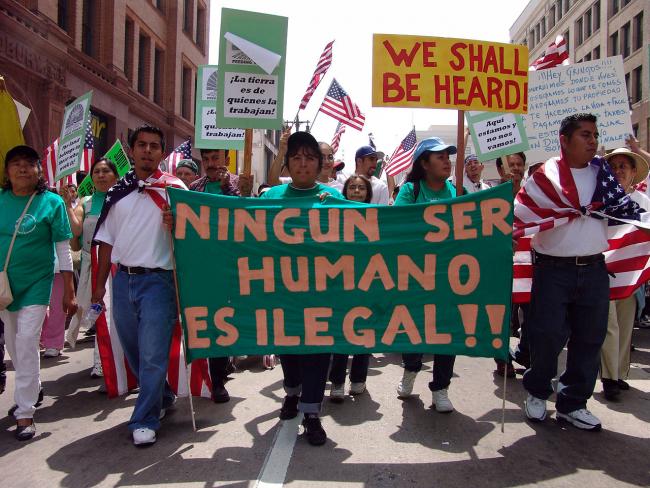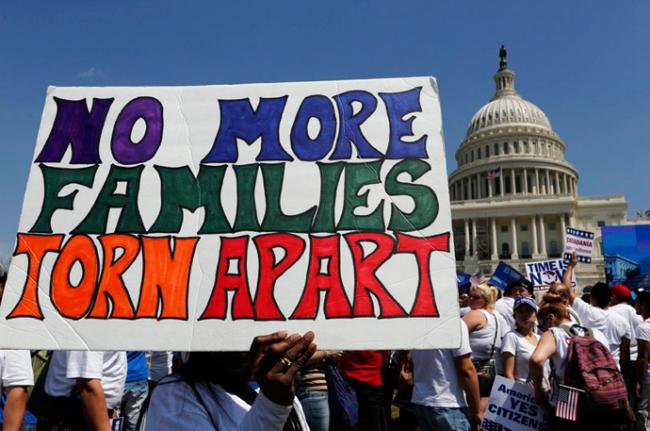March 7, 2017
Barely one month into the new administration and President Trump has already demonstrated he is willing to make good on some of his most dangerous campaign promises. Immigration raids from Los Angeles to Atlanta, coupled with a disastrously-conceived and implemented travel ban on citizens from seven Muslim-majority countries, have left many immigrants wondering just who will be targeted next.
The deportation of 35-year-old mother-of-two Guadalupe García de Rayos in Arizona, who had been in the US for 21 years, is likely just a taste of the type of inhumane and senseless immigration priorities we’ll be seeing from the Trump Administration.
Rayos’ story perhaps best crystallizes the acute fear of many undocumented immigrants, said Carlos Garcia, director of the immigrant advocacy group Puente Arizona. "We all knew something could be different this time with the new administration," he told The Los Angeles Times. "She went in with the lawyer and didn't come out. That was pretty much all there was."
Even in California—a state often viewed as a bastion of progressivism—the fear in immigrant communities has grown immensely under Trump, said Laura Polstein, a Senior Staff Attorney at the Oakland-based legal services agency Centro Legal de la Raza. She shared a story of one client who was too afraid to come to her consultation appointment for fear of being picked up by officials while on the highway. According to Polstein, while the woman was not at any real risk of arrest, “the fear is so palpable for people.” Other clients, she said, have held their kids home from school or are too scared to leave the house due to fears around deportation.
“Ever since the election I’ve gotten a lot of questions about Trump and the statements he’s making—people are really scared they’ll be deported,” Polstein said. “We hear it from people who have status and those who don’t.” She reported that the general mood among both immigrants and those working in immigration advocacy is “terrified.”
ICE officials, for their part, said that the recent coordinated operations across the nation had been planned for months and was targeted at those with prior felony convictions. Additionally, they said, the raids were little different from prior operations, including four day sweeps in 2016 and 2015 where hundreds of individuals were similarly taken into custody.
There is, in fact, a major difference from raids of prior years: a clear shift in deportation priorities.
Earlier this month, the Department of Homeland Security released documents updating its own policies on detainment—more closely aligning them withTrump’s aggressive promises on immigration. Under Pres. Obama, undocumented immigrants who had already been convicted of serious crimes were prioritized above all else. Now, officials are directed to detain and remove anyone convicted of any type of criminal offense.
Just after taking office in January, Trump signed an executive order that widely expanded who the federal government considers a priority for deportation, arguing that the order would make communities “safer” by targeting criminals who are in the country illegally. The order, however, which featured just-vague-enough language, leaves open for interpretation who exactly is considered a criminal and deserves priority—and in doing so, advocates say, makes sure there is no priority at all, no distinction between violent convicted felons and those charged with traffic violations.
“This is designed so Kellyanne Conway and [Sean] Spicer can stand up and say, ‘Well, we’re prioritizing criminals,” David Leopold, an attorney and past president of the American Immigration Lawyers Association, told The Atlantic. “But in reality they’re going after anyone they can get their hands on—period. It’s a ruse.”
The order, however, which featured just-vague-enough language, leaves open for interpretation who exactly is considered a criminal and deserves priority—and in doing so, advocates say, makes sure there is no priority at all, no distinction between violent convicted felons and those charged with traffic violations.
In the most recent wave of raids—even before the Department of Homeland Security published its updated policies—federal agents didn’t just pick up those with criminal histories. Numerous individuals without prior convictions were picked up as well, a departure from what was prioritized just one year ago. Under years of Obama policy, ICE officials avoided making “collateral arrests”—where undocumented immigrants who were not directly targeted in a raid are still detained as “collateral,” even without a warrant. Although Trump has claimed he will target murderers and rapists for priority deportation, early signs point otherwise.
According to an analysis by USA TODAY, while 90 percent of those picked up in raids in 2016 under the Obama Administration had been convicted of a crime, just 74 percent of the more than 650 people picked up during this month’s raids had criminal convictions.
Another telling example: during a raid last year in six Midwestern states, 85 percent of more than 300 immigrants arrested had been convicted of crimes. During a raid in those same states this month, just 69 percent had criminal records.
"This is the blueprint for mass deportations," warned Leopold in USA TODAY.
Perhaps what is most concerning on a sheer human-rights level is a case recently out of Texas, where an undocumented woman was arrested at a courthouse where she was seeking protection from domestic violence. It is likely that such examples will deter other vulnerable undocumented individuals from seeking help to escape violent or unsafe situations.
"This is the blueprint for mass deportations."
Still, said Polstein, the immigration attorney with Centro Legal, there is an enormous opportunity resistance—especially in California, which she hopes will continue establishing itself as a leader in inclusive public policies during the era of Trump. She said that she’s hopeful about the possible passage of the California Values Act, a recently proposed state bill that seeks to limit what information state and local agencies can share with ICE. She’d also like to see legislation that can address the lack of required legal council for undocumented immigrants in court.
“Now is a time for bold action and really try to differentiate ourselves as a state from what’s happening at the federal level,” she said.
In explaining his rationale for the California Values Act, bill author State Senator Kevin de León said that California should continue to be a beacon of hope and progress in the face of what may turn out to be inhumane immigration policy from the Trump Administration.
“To the millions of undocumented residents pursuing and contributing to the California Dream, the State of California will be your wall of justice should the incoming Administration adopt an inhumane and over-reaching mass-deportation policy,” he said in a statement.
Editor's note: The ideas expressed in this blog post are not necessarily those of the Haas Institute or UC Berkeley, but belong to the author.






